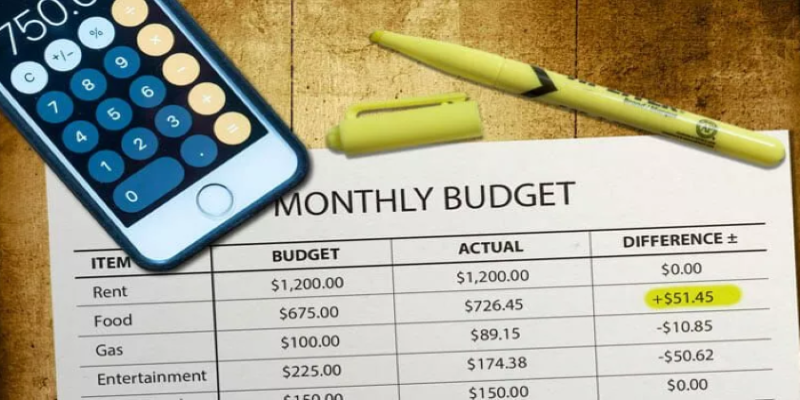Advertisement
Managing a budget can feel overwhelming, especially when you're trying to balance fixed and variable costs. Fixed expenses, like rent, utilities, and loan payments, are a consistent part of your financial obligations, but they can sometimes take up a substantial portion of your income. Understanding how to incorporate these fixed expenses into a budget can help maintain one's stability in terms of finances. By the end of this article, you will know how to handle these costs without having your flexibility and goals compromised.

In this guide, we break down simple steps for the inclusion of fixed expenses within your budget. We walk through what fixed expenses are and how they impact the budget and give actionable steps to ensure you're effectively planning. Whether you're preparing your budget for the first time or reviewing your current strategy, this process will move you toward a clearer view of your finances.
Before we get into all the budgeting strategies, let's define fixed expenses. It can be defined as expenses whose amount remains relatively the same every month, independent of your lifestyle or spending habits. Examples of fixed expenses comprise rent or mortgage, automobile payments, insurance, and some types of utility bills like telephone or internet service. These are predictable and necessary expenses, and unlike variable expenses (which vary, such as groceries or entertainment), fixed expenses are generally non-negotiable.
One of the key characteristics of fixed expenses is that they are consistent. Since you know they will remain the same every month; they should be one of the first focuses when you build your budget. Separating fixed and variable expenses helps for budgeting purposes, so you can get a clear picture of what is non-negotiable and where you have more flexibility.
Factoring in fixed expenses within your budget is not a good idea; it's a necessity. When you know how much you will commit to pay every month, you can allocate your income better. This gives a clear view of how much money is available for variable expenses such as groceries, entertainment, and savings.
If you do not account for your fixed expenses, then you will have a tendency to overspend in other areas. For instance, if you do not properly factor in your rent or loan payments, you could end up with less money than you thought you had for things like discretionary spending or emergency savings. Prioritizing fixed expenses in the budgeting process will save you from financial surprises, and you will be assured of having enough set aside for your non-negotiable costs.
To make sure your fixed expenses are properly factored into your budget, follow these simple steps.

The first step in budgeting for fixed expenses is to list everything that qualifies as a fixed cost. Look through your bills and financial statements for regular payments that occur monthly or annually. These can include rent, mortgages, utilities, car payments, insurance premiums, subscriptions (e.g., gym memberships or streaming services), and any other recurring charges.
Once youve identified all your fixed expenses, tally them up. This total represents the amount of money youll need to cover fixed costs each month. Its helpful to include both monthly and annual expenses, so if you pay something yearly (like an insurance premium), divide it by 12 to get the monthly amount.
Since fixed expenses are usually non-negotiable, its important to prioritize them when allocating your income. Make sure these costs are covered before you plan for variable expenses. This is crucial for maintaining a stable financial foundation. If you're trying to reduce your overall expenses, consider focusing on cutting down on variable costs first, as fixed costs are typically more rigid.
Fixed expenses may seem like they dont change, but they can still fluctuate. For instance, your insurance rates might increase, or your rent could go up after a lease term. Make sure you reevaluate your fixed expenses periodically, especially if youre moving or entering a new financial phase. This will help you stay on top of any potential increases or changes, ensuring your budget remains accurate and up-to-date.
Once you understand the importance of fixed expenses and have identified them, the next step is to use the right tools and strategies to keep your budget organized. There are many budgeting methods you can adopt, depending on what works best for you. For example, the 50/30/20 rule is a popular approach that allocates 50% of your income to needs (fixed expenses), 30% to wants (variable expenses), and 20% to savings or debt repayment.
Alternatively, you can use budgeting apps or spreadsheets to help track both fixed and variable expenses. These tools can make it easier to visualize where your money is going and help you stick to your budget. With a fixed expense tracker, you can set reminders for when payments are due and keep a close eye on any changes to these recurring costs.

The key is to find a system that works for your lifestyle and makes budgeting a straightforward task. Its also wise to have a cushion in your budget for unexpected expenses or cost increases related to your fixed obligations.
Factoring fixed expenses into your budget is essential for maintaining a clear financial plan. By listing, prioritizing, and reviewing these costs regularly, you ensure your budget remains realistic and manageable. Fixed expenses are a constant, but with careful planning, you can still achieve your financial goals without sacrificing financial stability. Whether youre new to budgeting or refining your approach, following these steps will help you maintain control over your finances, leaving room for savings and personal priorities. Budgeting with fixed expenses in mind allows you to create a balanced, effective plan for long-term success.
Advertisement

By Sean William/Jan 14, 2025

By Nancy Miller/Jan 01, 2024

By Maurice Oliver/Mar 18, 2025

By Pamela Andrew/Dec 21, 2024

By Christin Shatzman/Mar 16, 2025

By Sid Leonard/Mar 17, 2025

By Kristina Cappetta/Jan 08, 2025

By Celia Kreitner/Jan 14, 2025

By Jennifer Redmond/Jan 14, 2025

By Sid Leonard/Dec 21, 2024

By Gabrielle Bennett /Jan 14, 2025

By Isabella Moss/Jan 10, 2025